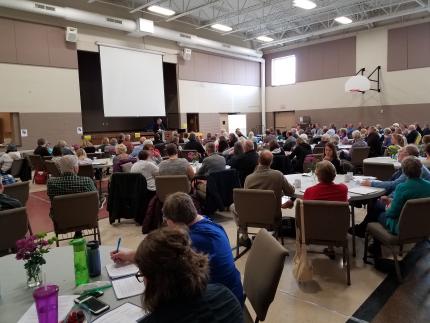Aging: Challenges and Opportunities

Whether we like to admit it or not, all of us are aging. It is not something we can cure or avoid.
While many may not like to age or may find ways in which to try to stop it from happening, a recent training event on aging sponsored by CRC and RCA Disability Concerns ministries affirmed that it is possible to age with grace and a sense of well-being.
Clearly, the topic of aging touched a chord, because nearly 150 people spent Saturday, April 21 at Maranatha CRC in Woodstock Ont., at an event ,titled "Aging: Challenges and Opportunities," talking all about aging and its effects on personal, family and church life.
Every year since 1996, Disability Concerns Canada, which is composed of regional disability advocates and others who work to help churches across Canada grow in their ministry with people who have disabilities, has sponsored a training event on disability and ministry in Ontario.
"Of the 12 years that I have been serving as the CRC's director of Disability Concerns, this Disability Concerns Canada conference was one of the best attended,” said Mark Stephenson. “I was especially pleased by the number of pastors and other church leaders who came to learn and grow. I assume the appeal of this topic stems from the aging population of Canada and of the CRC.”
Being serious about ministering well with the people in our churches and communities, said Stephenson, means “we need to keep learning” about ministry with people who are aging.
There is a temptation to assume that older people, and especially older people with impairments of various kinds, cannot contribute to the life of church and community.
“Nothing could be further from the truth,” said Stephenson. “Vital churches embrace and encourage the giftedness of all their members, whatever their age or ability.”
Judging from comments in the evaluation form, the bulk of attendees felt that attending the event, “better equipped them for ministry and handling with grace their own or family issues that come with increasing age," said Stephenson.
Keynote speaker, Dr. Syd Hielema, team leader for the Faith Formation Ministries of the CRC, spoke about “growing faith in the third third of life”, referencing Walter Wright’s work The Third Third of Life.
In his book, Wright divides life into three parts, or thirds: ages 0 – 30, 30 – 60, and 60+.
In our society, said Hielema, dominant views of aging are focused on loss, separation and on old age as being something that needs to be “conquered”.
Another example involves thinking along these lines: grow, serve, and fade. People who reach retirement age are often influenced to think, “My work is done,” leading to a sense of entitlement to pension, traveling, and living for oneself.
Along with these notions there is also the common cultural assumption that as one gets older, one’s usefulness, opinions, past mistakes, or family history define their identity.
But Hielema and the workshops at the event challenged such story lines by suggesting alternative approaches to aging, such as living “the third third of life” with gratitude and ever-increasing glory.
Hielema spoke to the biblical assumption that one’s identity is not based on one’s usefulness but on God’s grace.
It is in Jesus that we find our identity. Many of the workshops asked what churches might look like if they were truly intergenerational and also were blessing and being blessed by those who are in the third third of life (age 60 +).
Faith Formation Ministries (www.crcna.org/faithformation) has many resources available to help churches consider the intergenerational challenge and to explore how the “Building Blocks of Faith” can strengthen the place of “third-thirders” in your congregation.
Workshops at the event provided additional insights:
- “Supporting Seniors in Independent Living,” led by Elna Groot-Nibbelink, client care coordinator for the Victoria Order of Nurses in Eastern Ontario. This workshop looked at the ways in which churches and individuals can assist seniors in their communities to continue to live independently, respecting their needs and choices.
- “We Need a Big Umbrella: Engaging Possibilities for Multi-Ability Worship and Everyday Life,” presented by Amie Spriensma, who graduated from Dallas Theological Seminary in 2007 and is taking Clinical Pastoral Education to become a hospital chaplain. Her presentation looked at how we practice grace and empathy as we mature, grow, and pursue interpersonal relationships with others.
- “Parenting Your Parents: Challenges, Joys, and Ideas for Caring for the People Who Raised You,” presented by Mark Stephenson. This workshop examined the kinds of changes that can happen in the parent-child relationship as parents age, offered ideas for finding resources, and suggested ways to maintain healthy relationships with parents, siblings, and others in the final years of the parents' lives.
- “Aging with Grace and a Sense of Well-Being” presented by Siebert VanHouten, a retired CRC chaplain. Participants in this workshop looked at some of the factors that affect mental health in the older population, and strategies we can develop to maintain good mental health. Participants discussed strategies for church leaders to help senior church members and those who minister with seniors.


